
The Best Ecommerce Platforms for Dropshipping Businesses in 2025
With the rise of online business, there’s never been a better time to dip your toe in the dropshipping industry. If you’ve decided to start a dropshipping business, the first step is choosing the best ecommerce platform for dropshipping. Picking the right ecommerce solution for your online retail business is like establishing a good foundation for a house. It’s not just a tool to perform business activities online but an entire system that provides much-needed support and gives you better control over your dropshipping business.
With so many ecommerce platforms available on the market, it can be difficult to find the one that is best suited to your online business. Each platform offers a different mixture of features, from cost-effective plans to powerful analytics. Choosing the right platform can boost your customer base by providing a seamless shopping experience, a reliable online presence, and increased ROI.
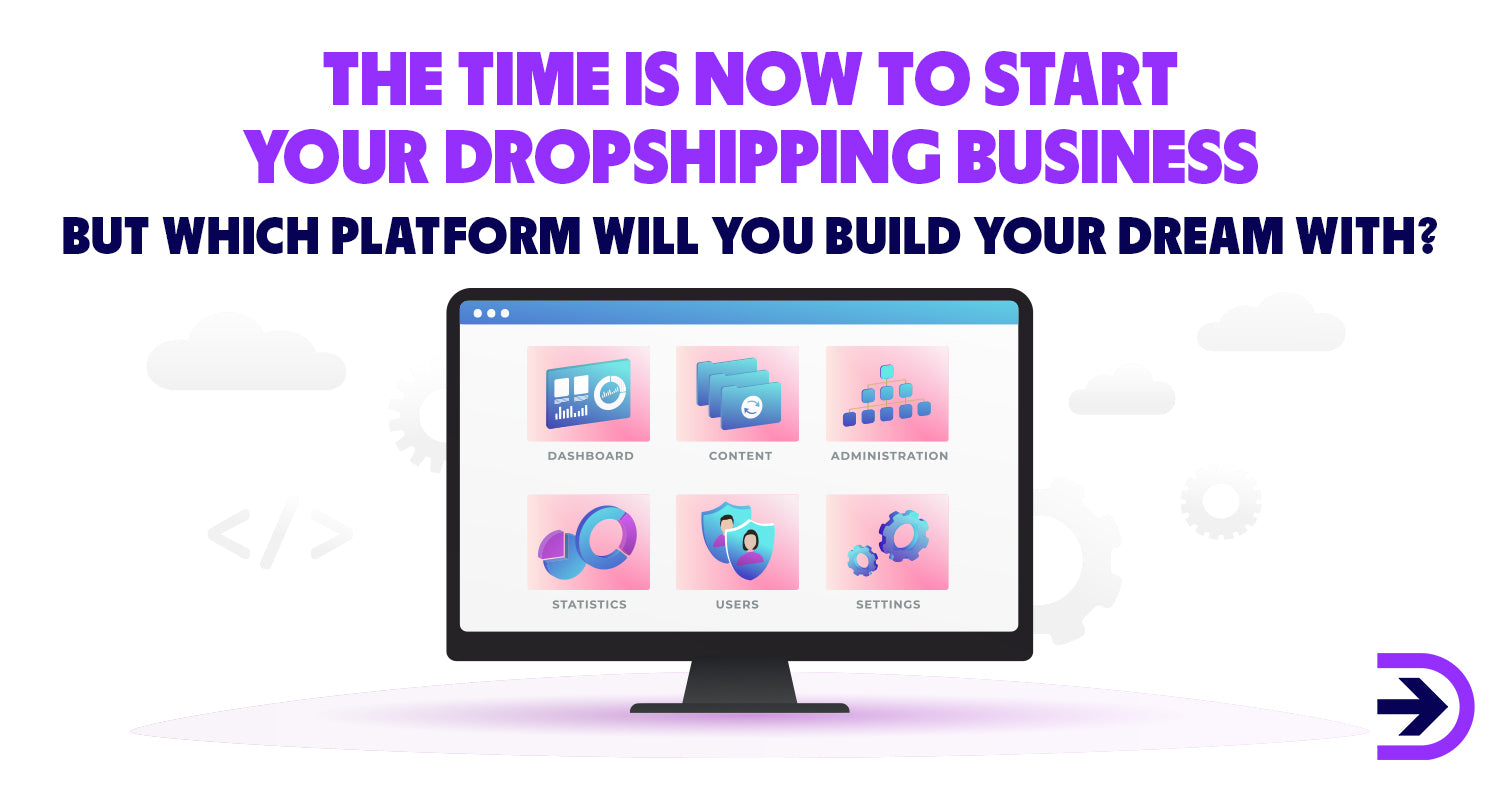
In this guide, we’ll take a closer look at some of the best ecommerce platforms for dropshipping. By the end of this piece, you’ll know the names of the best dropshipping platforms on the market and how to choose the ideal fit for your online store.
What is the best platform for dropshipping?
Every ecommerce platform is built differently, with unique features suited to various industries, business sizes, and levels of expertise. Some platforms are designed for startups or small online businesses, while others are built with large-scale businesses in mind. Some may integrate with brick-and-mortar stores, while others have an online-only focus, ideal for dropshippers. Before choosing an ecommerce platform, you’ll need to determine whether it suits your complete business needs.
Here’s how to choose the best ecommerce platforms for dropshipping.
Understand your ecommerce needs
One of the crucial steps in choosing the right ecommerce platform for dropshipping is understanding your ecommerce needs. Some may need the most flexible and customisable platform that’s easy to set up, while others may prefer overall the best ecommerce platform for dropshipping.

For those seeking strong SEO performance, WooCommerce should be your ideal choice. It’s an open-source software that runs on WordPress. The users have complete ownership of the store, which allows them to change any SEO-related specifics and optimise it for better performance. Additionally, dropshippers can take advantage of several plugins, such as Yoast SEO, Schema Pro, and AIOSEO, to improve WooCommerce product SEO.
Do your research
Every ecommerce platform is built differently, with unique features suited to various industries, business sizes, and levels of expertise. Some platforms are designed for startups or small online businesses, while others are built with large-scale businesses in mind. Some may integrate with brick-and-mortar stores, while others have an online-only focus, ideal for dropshippers. Before choosing an ecommerce platform, you’ll need to determine whether it suits your complete business needs.
Here’s how to choose the best ecommerce platforms for dropshipping.
Determine your costs
Dropshipping can be a cost-effective choice, but there are still some expenses to consider. These hidden costs include operating costs, marketing costs, technology expenses, ecommerce website costs, insurance and taxes, cost of sales, and legal costs.
These days, you can start an online business with almost no money at all. However, to see long-term gains, you’ll eventually have to put in some capital. It’s important to determine these potential costs beforehand so you can budget accordingly. To understand how to calculate your costs, you can read through this guide created by the Queensland Government.
Consider your future business plans
Do you intend to expand your ecommerce business or introduce new product categories? If you plan on growing your dropshipping business, you should choose a platform that scales with you.
As your dropshipping business grows, so will your site traffic. You’ll need to store more customer data, write more web pages, and process more payments. Make sure that the platform you choose can handle these increases. Failing to do so can result in significant losses for your dropshipping businesses.
Focus on secure payment solutions
Look for an ecommerce platform that provides safe and reliable payment gateways. Integrating a reliable payment gateway can help dropshipping stores increase conversion rates as the customers may feel more comfortable providing payment information, which ultimately generates more revenue.
The platform you choose should support multiple payment methods to make a transaction, enabling you to accommodate the needs of various customers. A convenient and hassle-free checkout and payment process makes for a painless online shopping experience. The Australian Government has created a handy guide to help you choose the payment methods that best suit your business.
Expert tip: Look for an ecommerce platform that invests in its back-end technology to provide you with better solutions.
Major factors to consider when choosing a platform for dropshipping
The platform you choose can greatly influence your dropshipping business growth. Imagine that you’re getting multiple visitors to your ecommerce store only to find it’s not functioning the way it should. Or, think about your checkout system collapsing and ultimately resulting in a loss of revenue that was more than you bargained for. Such problems can arise no matter the stage of business.
Here are key factors to help you select the best ecommerce platform for dropshipping.
Ease of use
There are many moving parts to dropshipping, from handling payments to managing multiple dropshipping suppliers. When evaluating ecommerce platforms for dropshipping, you should look for platforms that help you complete these tasks simply and efficiently. The platform you choose for your business should be user-friendly, making it easy for you to set up an ecommerce store with effortless navigation for a better customer experience.
The Baymard Institute conducted extensive research on how users scan, evaluate, filter, and sort products within an online store. A group of users aged 21-56 were selected for this research to test 19 leading ecommerce sites across eight different verticals. According to the research findings, users encountered more than 700 website usability issues related to product lists, filtering, and sorting.
Customers value ease of use and may avoid purchasing if your site is difficult to navigate. Create a user-friendly homepage, organise products into clear categories, and provide straightforward, visible shipping and refund policies. Additionally, ensure your payment process is smooth and accessible to encourage shoppers to buy from your store.
Dropshipping apps, integrations and plugins
Dropshipping apps, integrations or plugins are handy, allowing you to add functionality to your platform, connect with your dropshipping suppliers, import products, and manage inventory. They may even automate the order process so that when your customers place an order for a product, your dropship supplier may get automatically notified to initiate and process orders quickly.
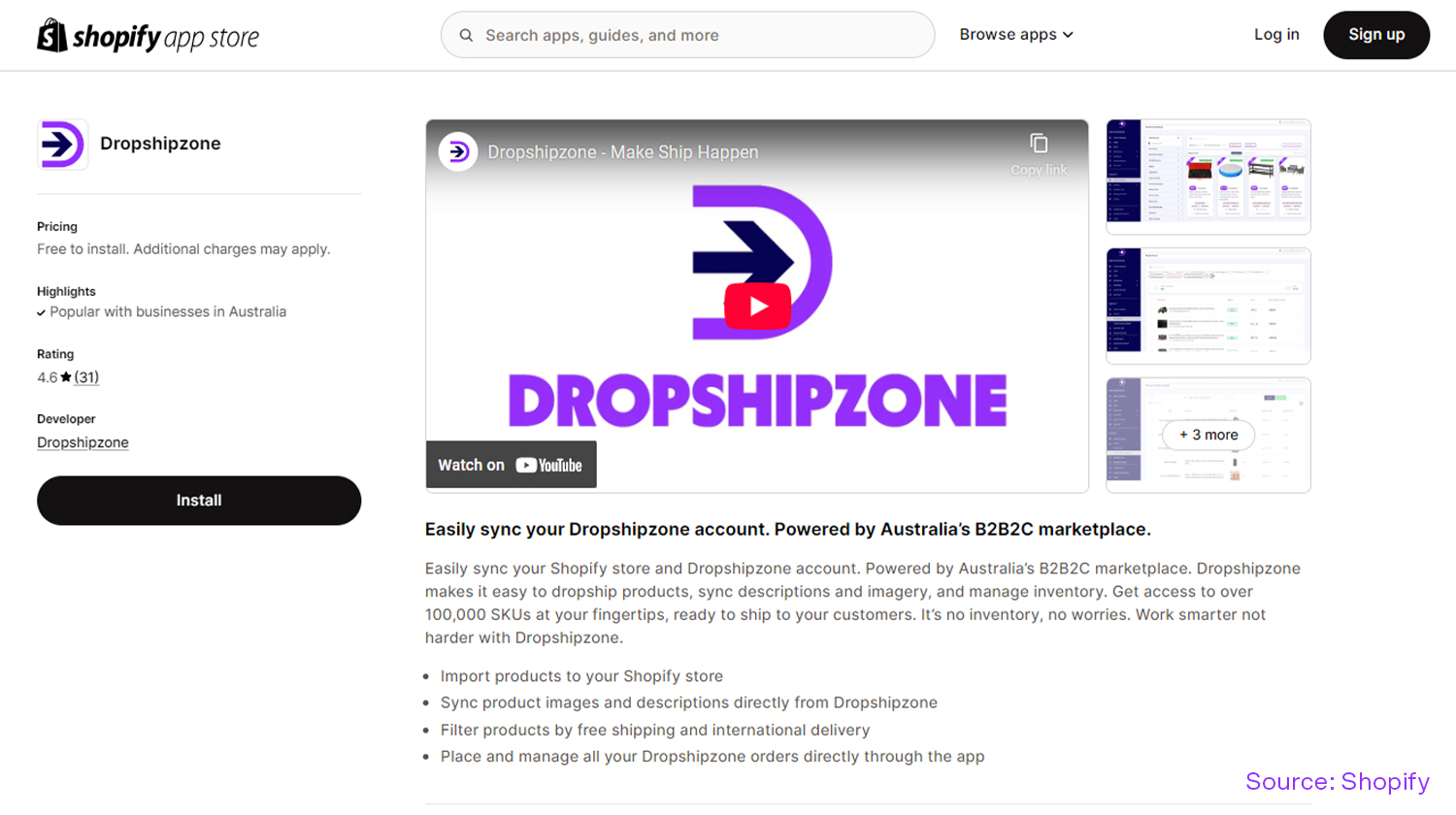
At Dropshipzone, we offer an in-house Shopify app to provide retailers with the best and most efficient dropshipping experience. Our Shopify store app is free to install and allows you to import products from the Dropshipzone catalogue, which offers over 100,000 SKUs across the most popular categories.
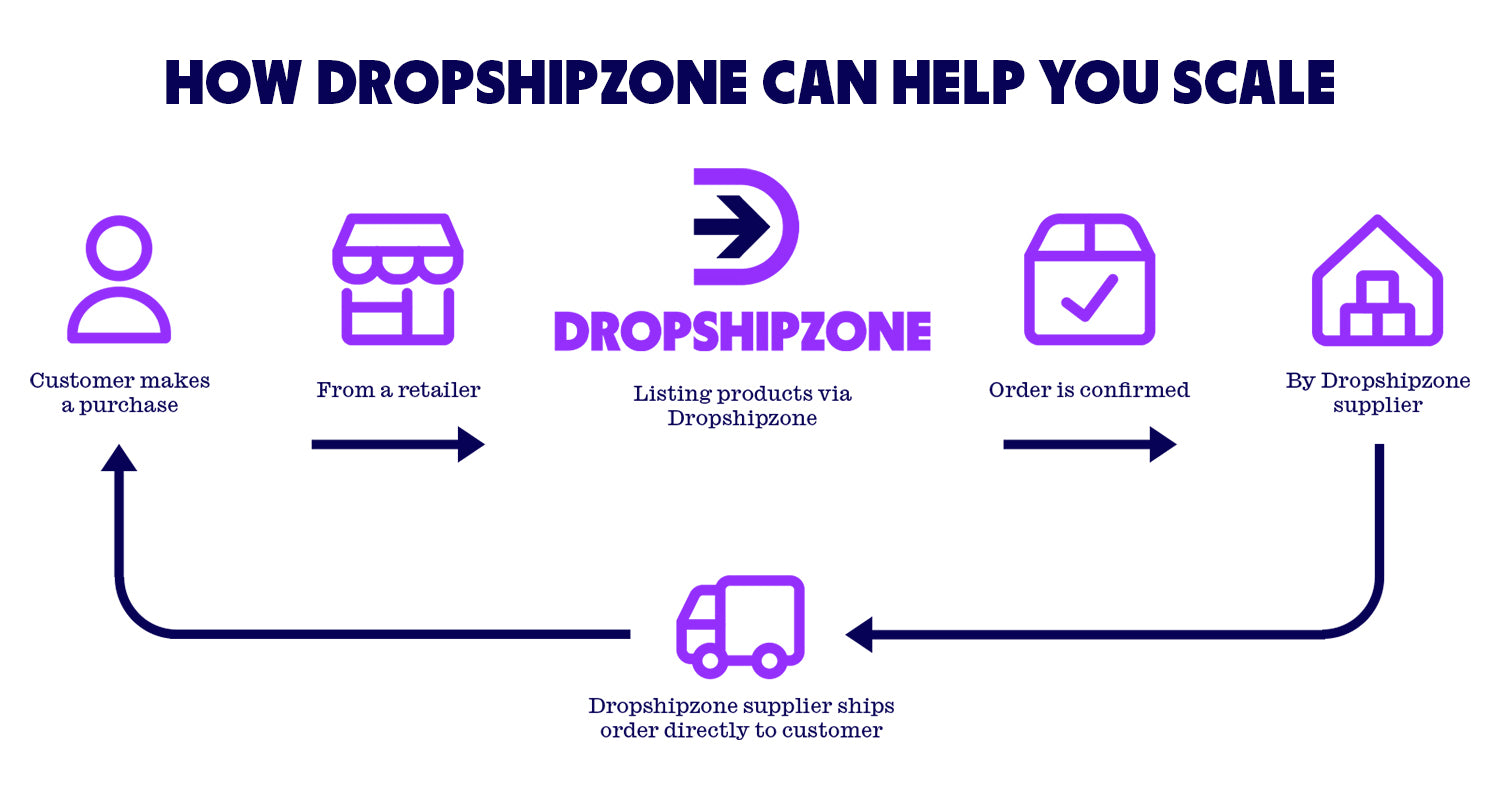
Expert tip: Ensure you review the dropshipping integrations before selecting your ecommerce platform for your business.
Customisation
Storefront customisation is a major deciding factor when choosing a platform for dropshipping stores. Different platforms offer varying levels of customisation. Some may offer templates with limited customisations, while others may provide extensive themes and storefront customisations to design an online store that reflects your brand personality.
When choosing an ecommerce platform, you can use an open-source platform or a software-as-a-service (SaaS) platform.
Open-source platforms, such as WooCommerce, offer full control over customisation, allowing you to tailor product pages, themes, and checkout experiences. However, these platforms have a steep learning curve and are best suited for those with strong coding skills or the resources to cover development costs.
SaaS platforms, such as Shopify and BigCommerce, can only offer limited customisations since the service provider controls the source code. However, these platforms can be an incredible option for those who lack technical expertise. With extensive themes, integrations and plugins, you can create a professional-looking website with little to no coding knowledge.
Pricing
Ecommerce platforms vary greatly when it comes to price. Some platforms may be free, while others charge high fees, particularly for enterprises. Each platform has its pros and cons that justify the pricing.
For instance, WooCommerce allows you to set up a dropshipping store for free. You have complete control over your online store and can design it as you want. But, it’s not suitable for beginners lacking technical expertise. On the other hand, Shopify charges AUD$42/month for its basic plan in Australia in 2024, which goes up to USD$2,300/month for its Plus package. However, if you want a hassle-free set-up with infinite scalability, Shopify may be the best choice for your business. It also offers some customisation features for your storefront.
You don’t want the cost of your ecommerce platform to overshadow your profits. So, consider ongoing costs and your return on investment (ROI) when choosing a dropshipping platform. Some platforms offer membership plans that include various features. You can select the package depending on your business needs.
IT support
It’s not always sunshine and roses when running an online business. Inevitably, there will be times when servers crash and software outages, which can affect your brand reputation and impact your revenue. In such events, you need strong backing from the IT support team to deal with unexpected issues.
Your service provider should be easy to contact by phone, email, or online chat, at a minimum during business hours, so you can quickly discuss the problems you’ve encountered with the experienced team at any time. A reliable and good service provider will provide solutions to your problems or requests in short order to ensure the smooth functioning of your business.
Scalability
As your business grows, you’ll attract a significant amount of traffic and might need more products, along with reliable order processing capability and additional functionalities that can help you keep up. If your ecommerce platform fails to keep up with these changes, it might result in slow loading time and data corruption. These changes may catch you off-guard and happen without warning. It can also negatively impact your customers' experiences and affect your sales. To avoid such unpleasant situations, you should choose a platform that will scale with your dropshipping business.
Built-in marketing tools
Building a dropshipping store is one part of the business, while marketing your store to your target audience is what should be your next step. Many platforms have built-in marketing tools and SEO features. Some also provide various plugins and integrations that you can use. It can be more convenient to choose a platform with inbuilt marketing and SEO tools.
The following are some tools that you should look for in a dropshipping platform.
-
Social media marketing tools to conveniently share special promos and other marketing-related activities on various social media platforms, advertise products and organise new product launch events.
-
Email marketing to keep your audiences updated about the upcoming offers, discounts, and sales and generate automated welcome and abandoned cart alert emails.
-
SEO tools to help you boost your performance on search engines.
If your selected platform doesn’t provide the essential tools you need, you might have to spend more money on additional apps and softwares.
List of the best dropshipping platforms in 2022
From the experts at Dropshipzone, here’s a list of the best-vetted and popular ecommerce platforms for dropshipping in 2024.
Shopify
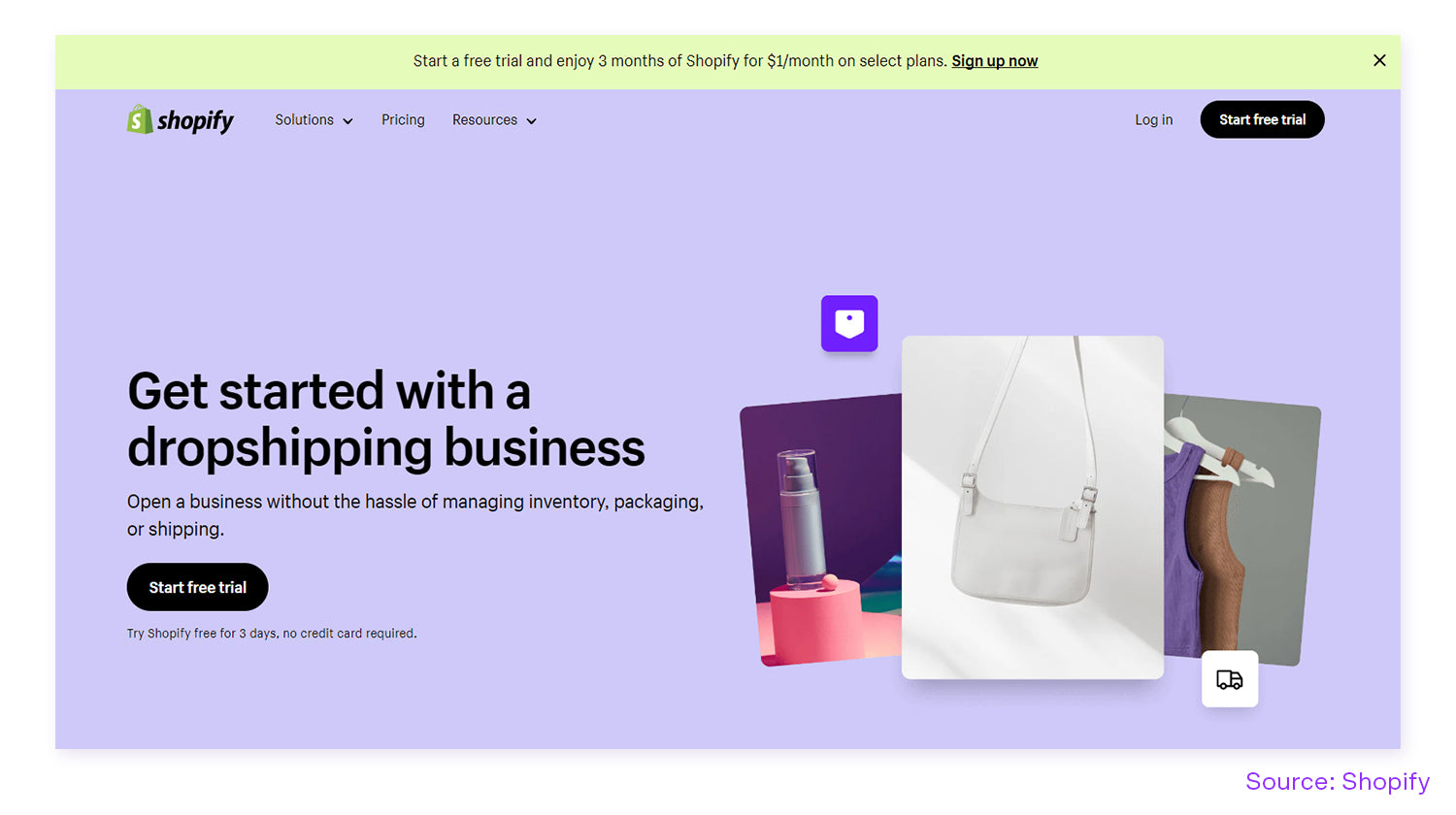
Undoubtedly, Shopify is among themost powerful ecommerce platforms on the market today. In 2017, Shopify acquired Oberlo, a dropshipping plugin that allows users to import products easily and enables efficient order fulfilment. It's a hosted platform, which makes it perfect for beginners without technical knowledge and skills. You don’t have to worry about purchasing hosting, SSL or installing software.
Shopify offers multiple built-in features, functionalities, and apps that make it easy and convenient to run a dropshipping business. Creating a Shopify account is simple, and it even comes complete with pages you need for your website. These include:
-
About Us
-
Privacy Policy
-
Shipping information
-
Shipping fee calculator
-
Return Policy
Setting up your dropshipping storefront with Shopify is easy and hassle-free. It has an easy-to-use interface, and you get 24/7 assistance via multiple channels, such as live chat, phone, and email. Shopify also has a knowledgebase and community forum where you can find answers to common questions. For most dropshippers, Shopify is a reliable ecommerce platform.
Key features of Shopify
Some of the key features of Shopify are listed below.
-
Hosted platform
-
Abandoned cart recovery
-
Integrated dropshipping plugins and apps
-
Fraud analysis
-
Get financial reports
-
Create an account before buying
-
Automatic shipping fee calculator
-
Multiple online sales channels
-
Excellent customer support
-
No limit on sales
-
Unlimited products
-
Third party support
Shopify pricing
Shopify offers a 14-day free trial without asking for credit card details. It has four pricing plans with different features from which you can choose depending on your business needs.
-
The basic plan is best for beginners with occasional in-person sales. You can get it for AUD$42/month billed annually.
-
The Shopify plan is ideal for growing businesses selling products online or in-store. You can get this plan for AUD$114/month billed annually.
-
The advanced plan is perfect for scaling businesses that require high-level reporting. This plan is priced at AUD$431/month billed annually.
-
The Shopify Plus plan is designed for more complex businesses. It starts at USD$2,300/month on a three-year term.
Pros
-
Quick and hassle-free store set-up
-
Customisable themes
-
Easy-to-use interface
-
24/7 customer support and online community forum
-
Access to over 6,000 apps via the Shopify App Store
-
SEO friendly
-
Fast loading times
-
Built-in marketing tools
-
Multiple dropshipping integrations
-
Mobile-friendly designs
Cons
-
Limited customisations
-
Not a free platform
-
Shopify Payments limited to some countries
WooCommerce
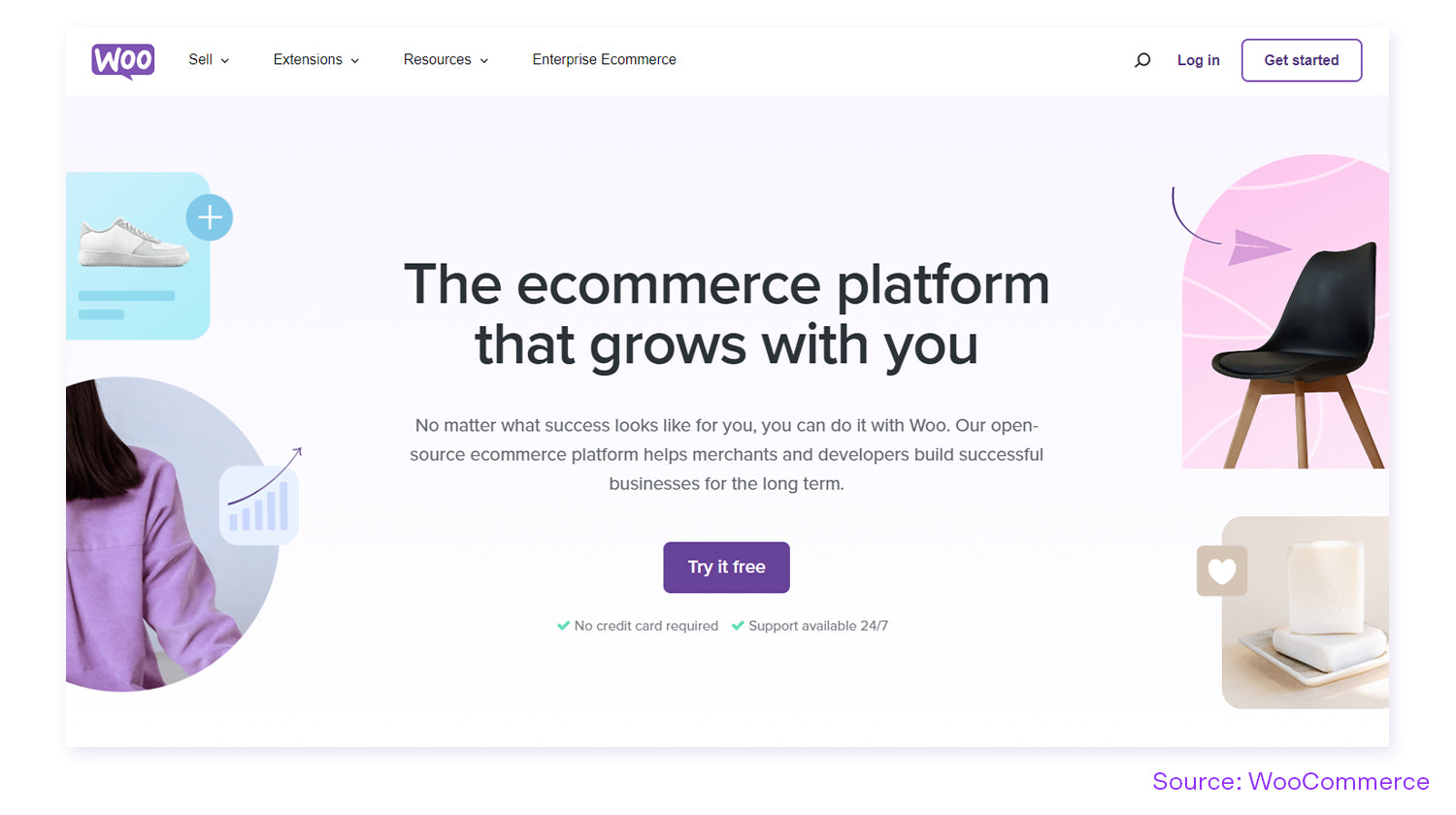
WooCommerce is an open-source ecommerce platform, which gives you more control and freedom over your online store. It’s completely free to download, use, and modify, however, you’ll have to pay for your web hosting account. Its prices could vary depending on the hosting and the package you choose. It comes with a GUI interface that’s similar to a road map, which guides users on how to do something. To get the best out of this platform, the users should possess at least some technical knowledge and skills.
For dropshippers,WooCommerce provides a premium ‘WooCommerce Dropshipping’ module, which is priced at USD$79 billed annually in 2024, but comes with a 30-day money-back guarantee. It helps you manage your entire dropshipping operation within WooCommerce and comes with AliExpress integration and Amazon Affiliate support.
Key features of WooCommerce
Some of the key features of WooCommerce are listed below.
-
Open-source ecommerce platform
-
Highly customisable
-
Easy to use and modify
-
Simple GUI interface
-
Widespread community of designers and developers
-
Robust SEO features
-
Automate order notifications to your suppliers
-
Enables to work with multiple suppliers
-
Import unlimited products
-
Supports major dropshipping plugins
-
Multiple built-in marketing features
WooCommerce pricing
WooCommerce is free to download and install. But you’ll have to pay for hosting and some premium features, which can quickly add up the costs. For dropshippers, in 2024, WooCommerce provides a premium ‘WooCommerce Dropshipping’ module that’s priced at USD$79 as an annual fee and comes with a 30-day money-back guarantee.
Pros
-
Free to download
-
Comes with a WooCommerce Dropshipping module
-
More freedom and control over your website
-
User-friendly platform
-
Multiple extensions
Cons
-
Not suitable for non-technical users
-
Hosting and maintenance costs
Wix
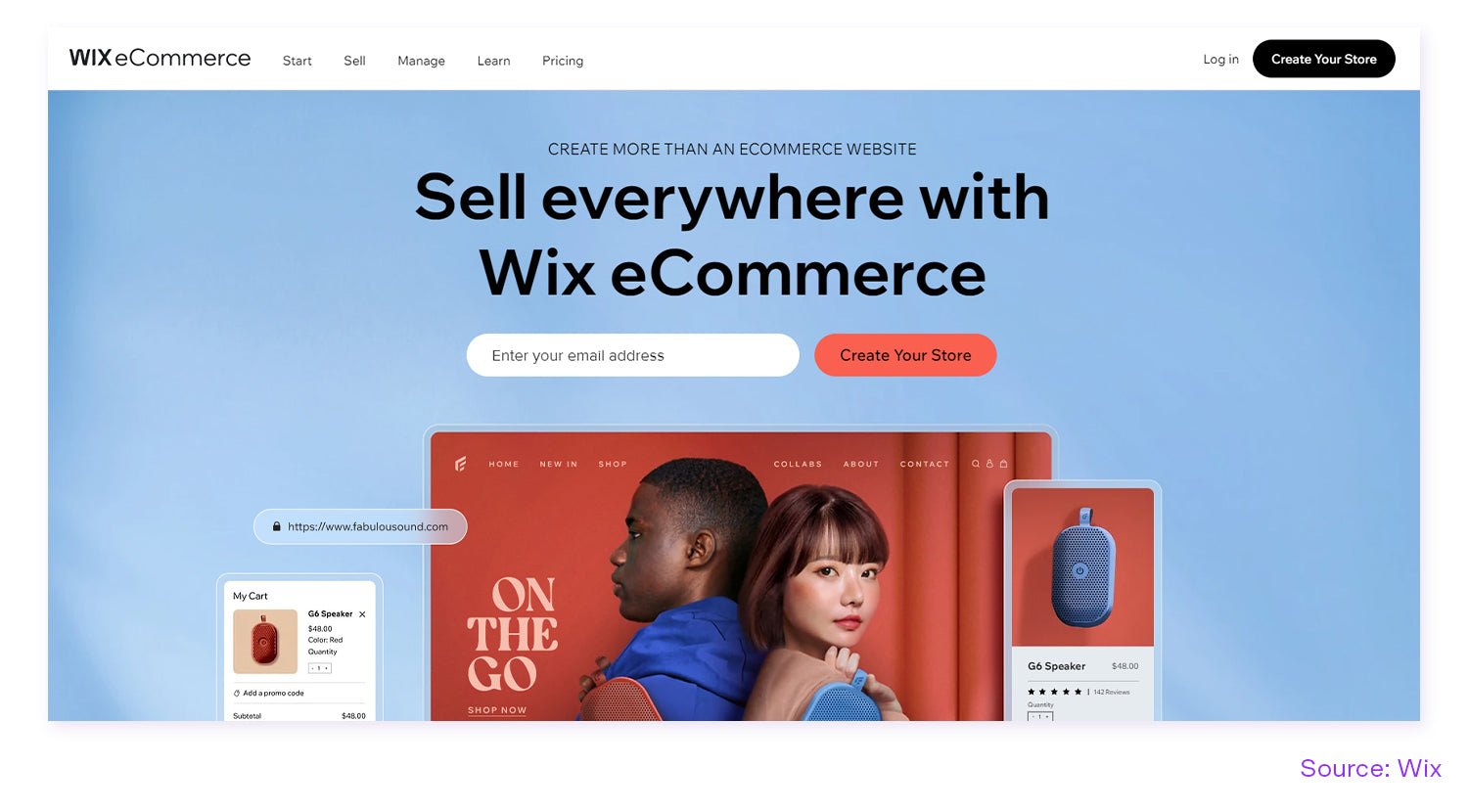
Wix is a hosted ecommerce platform that started as a content management system but added several ecommerce features over the years. Wix has easy to use functionality and interface. It has a user-friendly drag-and-drop website builder, which enables you to get your online store up and running quickly. You also get customisable templates, web hosting, and domain name registration.
You can build abasic website for free with Wix, but you’ll have to upgrade to a paid plan to use its ecommerce features. Wix lets you track orders, accept online payments, sell products on multiple channels, and create abandoned cart campaigns. Though Wix offers many features to run an online store, it may not be the best ecommerce platform because it lacks some essential features, such as EDI support, required for running a dropshipping store.
Key features of Wix
Some of the key features of Wix are listed below.
-
Hosted ecommerce platform
-
500+ professional templates
-
Mobile-optimised storefront
-
Multichannel sales
-
Customisable online store
-
Extensive media library
-
Limitless customisation with APIs
-
Built-in marketing features
-
Suits global ecommerce business
-
Built-in SEO tools
-
Smart business automations
-
Efficient catalogue and inventory management
-
Exclusive dropshipping features
-
Hassle-free fulfilment
-
Abandoned cart recovery
Wix pricing
Wix offers hundreds of website templates, unlimited pages, and top-grade hosting for free. It offers three different plans, enabling you to choose what best suits your business needs. The Wix premium plans are categorised into four types:
-
The Business Elite plan is designed to scale your business. You can get it for AUD$179/month.
-
The Business plan is designed to grow your brand. You can get it for AUD$49/month.
-
The Core plan is designed to engage your audience. You can get it for AUD$33/month.
-
The Light plan just offers basic features. You can get it for AUD$16/month.
These plans are priced differently and offer various features to suit your business needs.
Pros
-
Drag and drop tools
-
Excellent features for building a dropshipping store
-
Impressive features and tools to grow and scale
-
Customisable templates
-
SEO tools and hundreds of apps
-
Beginner-friendly
-
24/7 support
Cons
-
Difficult to switch your template
-
Tracking and analytics require paid plan
-
Weak integration with Amazon
-
Limited customisation options
BigCommerce
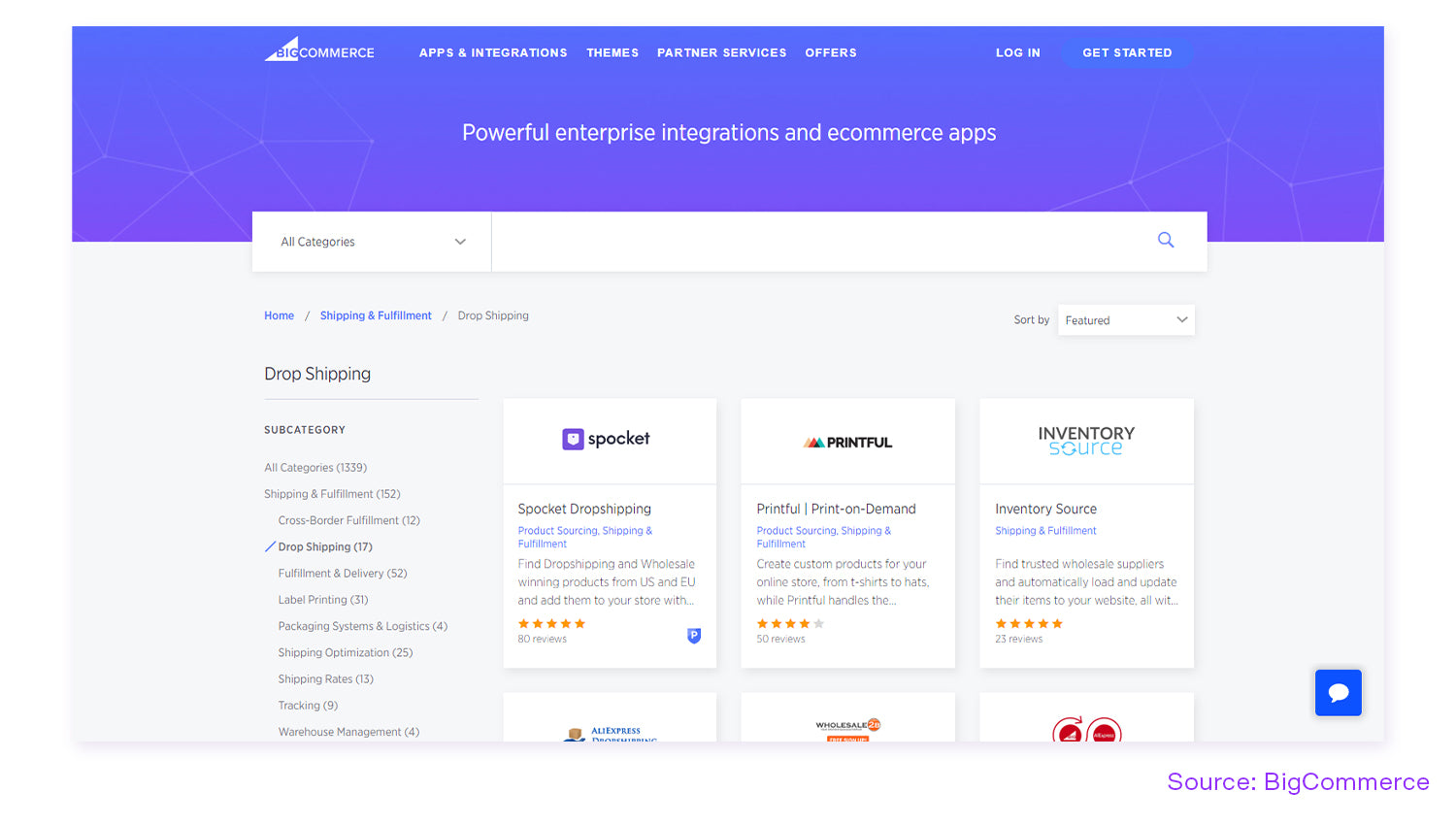
BigCommerce is a hosted platform that has complete server hosting. It’s best-suited for a larger or fast-growing business with more resources based on the opportunity for customisation. Users with minimal design skills can use this platform effectively, but it doesn’t offer the same amount of customisation options. However, those with advanced technical expertise can customise the platform to meet their business needs.
You can convert anyBigCommerce store to a dropshipping store using apps from the App store. There are multiple integrations that can make it easy to add new products to your product catalogue. On this single ecommerce platform, you can host an unlimited number of products, with no limits on file storage or bandwidth.
What makes BigCommerce stand out is excellent customer support. It provides 24/7 service with phone calls, ticketing, and live chat. There’s an extensive knowledge base, an active online forum, and multiple video tutorials helping you provide your customers with the best online experience.
Key features of BigCommerce
Some of the key features of BigCommerce are listed below.
-
Hosted platform
-
Perfect for small and large businesses
-
Extensive built-in tools
-
Platform-wide APIs
-
Drag-and-drop PageBuilder
-
No additional transaction fees
-
Robust SEO services
-
Social media marketing and email marketing services
-
Advanced reporting
-
Inventory management tools
-
Personalised site audits
-
Robot.txt and customisable URLs
-
Featured channel integrations
-
Plugin POS integrations
BigCommerce pricing
BigCommerce offers enterprise-level plans in 2024 designed to take your business to the next level. There’s no set dollar amount, as they provide pricing tailored to each business’ needs at different growth stages. Furthermore, it doesn’t charge additional transaction fees and offers 15 days free trial. Additionally, BigCommerce offers other essential plans for businesses of all sizes.
-
The standard plan is priced at USD$29/month billed annually.
-
The plus plan is priced at USD$79/month billed annually.
-
The pro plan is priced at USD$299/month billed annually.
BigCommerce provides you with the option to pay annually and save up to 10 per cent on your total price. However, this offer is available for Standard, Plus and Pro plans.
Pros
-
Easier to use
-
Better support
-
Fast performance
-
Continuous updates
-
Complete control
-
24/7 customer support
Cons
-
Limited dropshipping platform integrations
-
High cost
-
Limits on annual sales
Magento
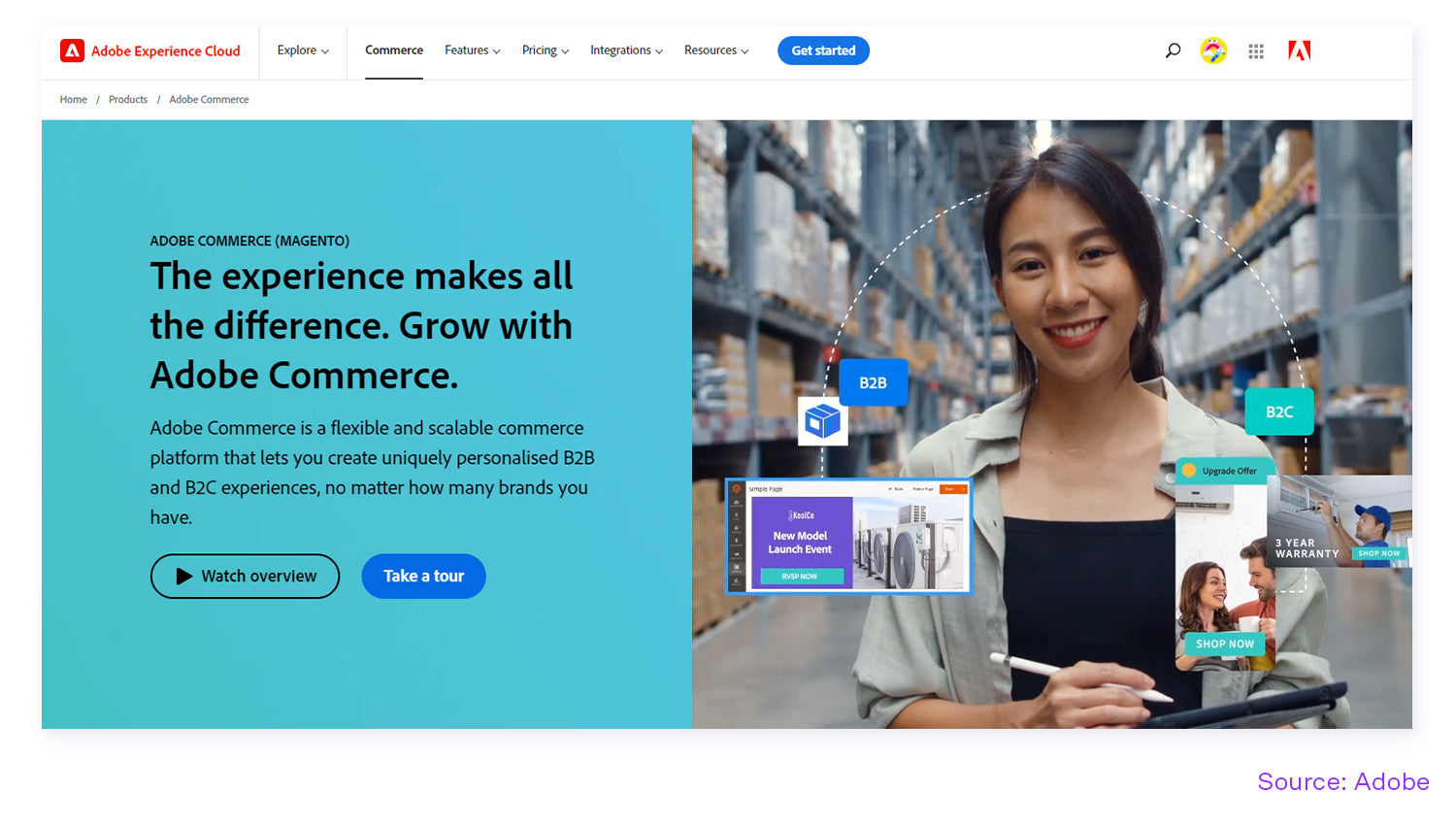
Magento, now Adobe Commerce, offers two versions: Magento Open Source and Adobe Commerce. It’s a great ecommerce platform designed for developers who want a powerful and flexible system that allows customisation and excellent scalability.
Magento is not as 'beginner-friendly' as other ecommerce platforms. You will find orders, product categories, and marketing features displayed on the dashboard. But as you go through different sections, you will find numerous options that may make you feel more overwhelmed than if you were using other platforms.
Magento has powerful built-in features, supports major dropshipping plugins, and has endless SEO possibilities. Additionally, Magento’s marketing integrates with Google Analytics, Google Adwords, Google Tag Manager, Google Content Experiments, and Google Privacy Setting. It also allows you to generate unique coupon codes for promotion and export the list for emails and newsletters.
Key features of Magento
-
Non-hosted, developer-friendly platform
-
Accurate inventory management
-
Advanced order fulfilment
-
Third-party integrations
-
Extensive reports
-
Real-time sync orders, customers, and inventory data
-
Strong SEO performance
-
Catalogue management
-
Advanced analytics and reporting tools
-
Marketing and promotional tools
-
Mobile-responsive themes
-
Multiple site management features
-
Order management and access to customer accounts
Magento pricing
Magento Open Source is a free ecommerce platform to download and install. However, you will need to cover the cost of hosting, domain, extensions, and development fees. Adobe Commerce is a paid premium version that suits enterprise-level businesses and offers impressive dropshipping features and solutions. You must sign up for a demo with the sales team to get the pricing information for your business.
Pros
-
Easy to scale up
-
Self-hosted data
-
Intuitive back-end interface
-
Supports several dropshipping apps and plugins
-
No hidden or extra charges
-
Fast payment processing and shipping
-
High flexibility and customisation
-
GDPR compliant
Cons
-
Complicated pricing structure
-
Higher running and operation costs
-
Requires developer skills
-
Expensive themes
-
Can affect loading times
Which one should you choose: Hosted vs Open-source platforms
When it comes to ecommerce platforms, there are two options that you can choose from - hosted and open-source platforms. Each ecommerce platform has its pros and cons. So, which one should you choose? It’s essential to understand the difference between the two and how each works to make the right choice for your business.
In this section, we’ll deep dive into hosted and open-source platforms to gain a better understanding of these platforms.
Hosted platforms
Hosted ecommerce platforms are a good choice if you want to build a dropshipping store in the most hassle-free way. They’re a type of software as a service (SaaS) that hosts online stores. You don’t need to look into the technical side of building an online store as hosted platforms include hosting and software, which enables you to set up the store easily without worrying about coding, web hosting, or version updates.
Hosted ecommerce platforms make a practical solution for non-techies. Setting up a website from scratch can be overwhelming, especially for those with limited technical expertise. A hosted ecommerce platform is already hosted by the service providers on their servers, which makes it easier to get the site running efficiently.
The platform comes with reliable online payment integration, efficient inventory management, powerful server technology resources, and expertise in compliance and security pertaining to web-based transactions and data management. You can also use their web templates, themes, and designs to customise your dropshipping store. Furthermore, you get dedicated and timely support from the excellent customer service team 24/7 via email, chat, and call if you need help.
However, the only downside of hosted ecommerce platforms is that you have limited control over the site and its features. Some ecommerce platforms come with pre-installed plugins or can be installed on purchase. If you need additional advanced features, you have to choose from one of their plans and pay extra for the plugins or site features you need.
The below table lists the pros and cons of hosted ecommerce platforms.
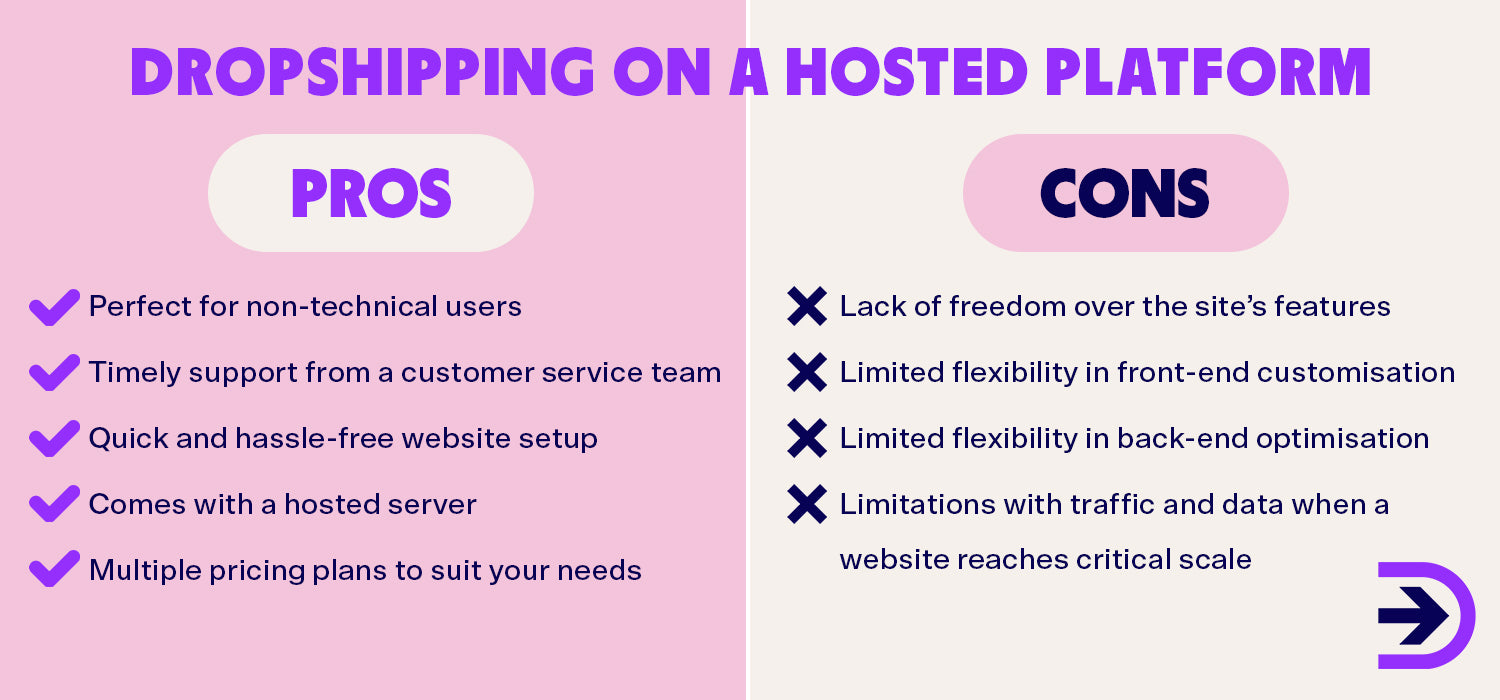
Examples of hosted ecommerce platforms
-
Shopify
-
Wix
-
Squarespace
-
BigCommerce
-
3dcart
Open-source platforms
If you want complete control of your dropshipping store and prioritise customisation over anything else, then open-source platforms are the ideal choice. Open-source platforms, also known as self-hosted platforms, allow users to view and modify the original source code. This means you have complete control and infinite flexibility to customise your dropshipping store.
When you choose an open-source platform, you’ll have to use your own server space to host your ecommerce platform or pay monthly fees to rent space from a third-party hosting provider. It requires you to manage your hosting account, manually set up plugins and other integrations, and deal with installations and updates. You should also possess strong technical and coding skills for ongoing website management, such as updates, bug fixes, and website maintenance.
If you lack technical expertise, all of these might turn you off, and you might have to outsource or rely on internal resources to get the job done. This can quickly add up the costs and may leave you hanging in times of emergency without professional backing from the customer support team. You can still get some technical support from online forums and threads where fellow dropshippers share knowledge and experience to help each other and stay afloat. Without knowledge or prior experience, it can become challenging to use open-source platforms in the long run due to their complex nature. It may also result in higher expenses and lower revenues.
The below table lists the pros and cons of open-source ecommerce platforms.

Examples of open-source platforms
-
Magento
-
WooCommerce
-
OpenCart
Have a quick glance at the below table that summarises the main differences between the hosted and open-source ecommerce platforms.
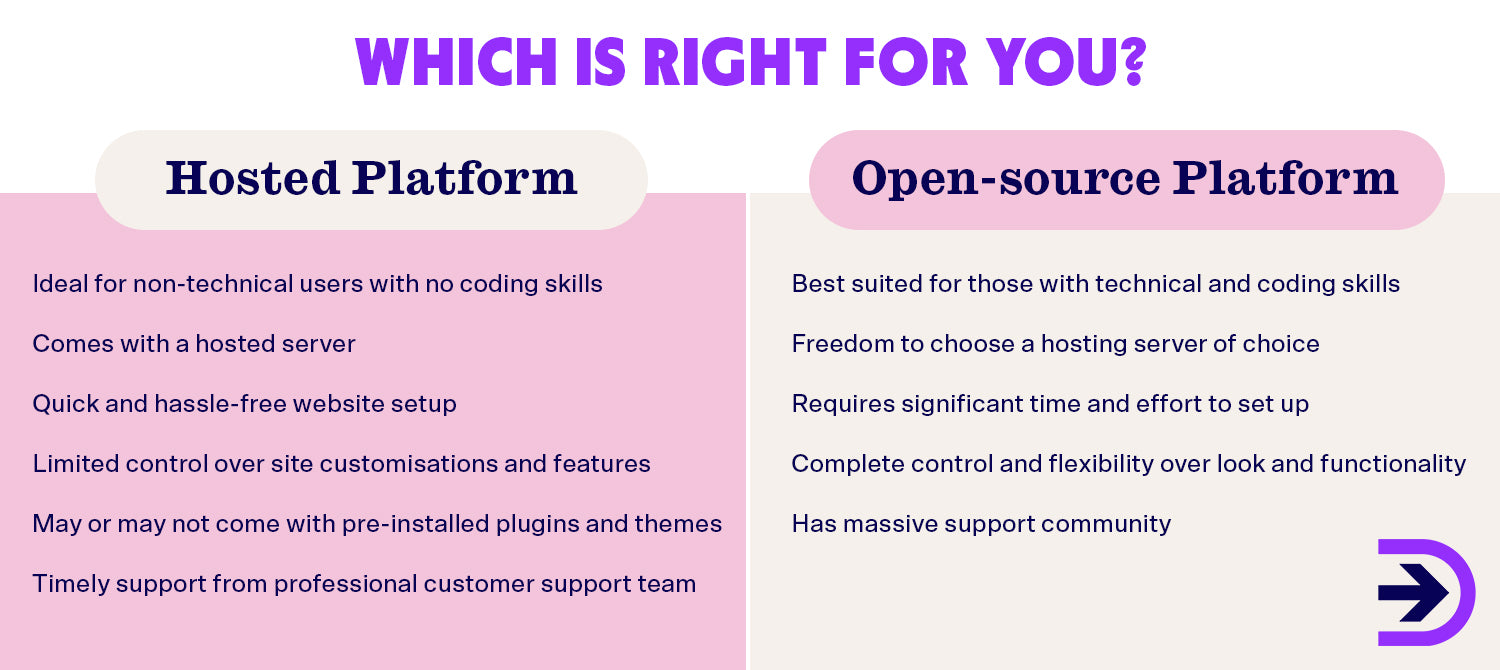
Our recommendation
According to the latest Statista 2024 research on leading ecommerce platforms worldwide, WooCommerce is the leading ecommerce platform in 2024, with a market share of 38.74 per cent. Squarespace and Shopify have a market share of 14.67 and 10.32 per cent, while Wix stores have a total market share of 8.09 per cent, and the others contribute 13.22 per cent.

After reviewing multiple ecommerce platforms, the team at Dropshipzone recommends Shopify as the best all-around platform for dropshipping due to its extensive range of ecommerce features. It's backed by many dropshippers and new and established entrepreneurs for its consistently high and unhindered performance over the long term.
Build your dropshipping store with Shopify
Shopify comes equipped with all the tools to create a seamless customer experience that will encourage visitors to make purchases without hesitation. According to the Forbes Business Council, the checkout process is a hurdle in converting customers into buyers. Shopify has a straightforward, reliable, and hassle-free checkout process, which reduces cart abandonment rates.
Furthermore, Shopify has an easy-to-use interface, enabling you to set up your ecommerce site and get it running without any technical expertise. It offers 24/7 customer support to all its users. Most importantly, Shopify has a suite of tools to help you manage every aspect of your dropshipping business. It also has an App store with over 4,000 apps that enable you to customise the ecommerce experience for your customers and yourself. Its straightforward, easy-to-navigate interface makes it a popular platform choice for those wanting to start dropshipping.
Start or scale your ecommerce business with Dropshipzone
If you’re looking for reliable and trustworthy dropshipping suppliers in Australia, consider partnering with Dropshipzone. We're Australia’s B2B2C marketplace that can help retailers build a dropshipping business from scratch.
Dropshipzone carries over 100,000 SKUs from reliable dropshipping Suppliers, enabling you to carve out your own dropshipping niche by curating your product offering. We’ve got a dedicated quality control team that ensures product quality, safety, and compliance from quality dropshipping Suppliers to ensure your peace of mind. And our efficient customer service team will always have your back in times of unexpected crises. Additionally, we’ve partnered with reliable shipping companies, so rest assured products will reach your customers within a short period.
Our dropshipping Suppliers source products directly from wholesalers and manufacturers, meaning you get products at competitive prices that enable you to make good profits as you make sales.
Whether in terms of pricing, product range, customer service, order processing times, or integration possibilities, Dropshipzone has got you covered.



